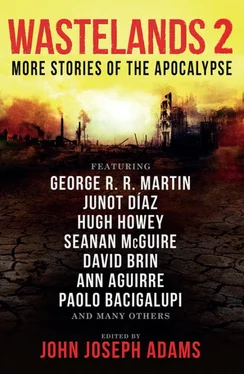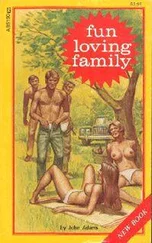* * *
Gloria beats Hope again, harder and longer this time. She and Bill might have put me out of the house, except that I have no place to go. So they settle for keeping me away from Hope, so that I cannot lead her further into sin.
Bill speaks to me only once about what happened. Bringing me my meal—meager, so meager—he averts his eyes from my face and says haltingly, “Mama… I…”
“Don’t,” I say.
“I have to… you… Gloria…” All at once he finds words. “A little bit of sin is just as bad as a big sin. That’s what you taught me. What all those people thought before the Crash—that their cars and machines and books each only destroyed a little air so it didn’t matter. And look what happened! The Crash was—”
“Do you really think you’re telling me something I don’t know? Telling me ?”
Bill turns away. But as he closes the door behind him, he mumbles over his shoulder, “A little bit of sin is as bad as a big sin.”
I sit in my room, alone.
Bill is not right. Nor is Gloria, who told him what to say. Nor is Hope, who is after all a child, with a child’s uncompromising, black-and-white faith. They are all wrong, but I can’t find the arguments to tell them so. I’m too ignorant. The arguments must exist, they must —but I can’t find them. And my family wouldn’t listen anyway.
Listen, Anna, that’s a—
A nightingale.
The whole memory flashes like lightning in my head: my father, bending over me in a walled garden, laughing, trying to distract me from some childish fall. Here, Anna, put ice on that bruise. Listen, that’s a nightingale! A cube of frozen water pulled with strong fingers from his amber drink. Flowers everywhere, flowers of scarcely believable colors, crimson and gold and blue and emerald. And a burst of glorious unseen music, high and sweet. A bird, maybe one from Birds of India and Asia .
But I don’t know, can’t remember, what a nightingale looks like. And now I never will.
JIMMY’S ROADSIDE CAFÉ
RAMSEY SHEHADEH
After the world ended, Jimmy set up a roadside café in the median of I-95, just north of the Fallston exit, in the grassy depression between the guardrails. His first café, nothing more than a plywood shanty, fell to the first thunderstorm that blew through. The second was better: he dug a sort of foundation and built the walls out of heavy plywood he’d harvested from an overturned Home Depot truck, reinforced the corners with steel joints, laid down a sheet of tin for the roof. He used a Hummer’s windshield for the front window, a thick yellow shower curtain for the door. And then he nailed an Open/Closed sign beside the doorway, flipped it to Open , settled down in his lawn chair, and waited.
Two days later he got his first customer.
She was half gone already, her face a mass of pinkish sores, one of her eyes pure red and swollen nearly out of its socket. She came out of the north, staggering drunkenly between the ranks of stopped cars, moving with the hitched, staccato gait of creeping atrophy.
“Hello!” he cried, and jumped up, waving frantically, then rushed onto the road and wended his way through the dead cars, toward the woman. He stopped in front of her, panting, smiling broadly, and held out a hand. “Welcome to Jimmy’s Roadside Café. I’m Jimmy.”
The woman stopped, swayed, put a hand on the side of a Corolla to steady herself. She was wearing a man’s trench coat over sweats, sneakers at least two sizes too big for her, a pink floral top. She studied him for a moment, then said: “I need help.”
“Of course,” said Jimmy, smiling broadly. “Come inside.”
It was a grey day, threatening rain. He took her by the arm and led her down into the median and through the café’s canted doorway to its only booth, the backseats of a Buick and a Lincoln flanking a small table. He bustled away and came back with a Scooby-Doo glass half-filled with brandy, and a donut that clattered like cutlery when he dropped it on the table.
“House special,” said Jimmy.
She looked at the donut, but made no move toward it.
“Don’t worry, you’ll be able to keep it down,” said Jimmy. “You just need to have the brandy in you first.” He raised the glass to her lips. “Trust me.”
She made a face, but drank. Tentatively at first, then in long drafts.
Jimmy sat down across from her and snapped the donut in two, handed one half to her, and started on the other. It tasted like sweetened cement, hard on the outside and chalky on the inside. But he chewed and swallowed, downing it like medicine, and eventually she followed suit.
“What’s your name?” said Jimmy.
“Margaret.”
“I’m very pleased to meet you, Margaret.”
“I’m looking for my husband,” she said.
Jimmy frowned, didn’t answer. Her words dropped into the silence, like coins falling down a well.
“His name is Nabil. He’s Lebanese. He’s a lawyer.”
Jimmy held up a finger, and went behind the bar—a long board laid atop two towers of stacked cinder blocks—and pulled his drawing pad and pencils out of a cardboard box with the word Basement scrawled on its side in red marker.
“All right,” said Jimmy. “What was his head shaped like? Thin and tapered?”—he drew a wedge—“Or plump?”—an oval—“Or square-jawed?”—a trapezoid.
“Plump. But not that plump.”
“Okay.” He drew a narrower oval. “Nose?”
“Biggish. Wide nostrils.”
He drew it. “Like this?”
She shrugged. “I guess.”
“Good. Eyes?”
And they worked their way through it, building the dead man’s face, feature by feature, until they had a portrait. He sketched in a thicket of short black hair, curly and tousled, and a thick neck with a prominent Adam’s apple, then spun it around. “Like that?”
She nodded. “That’s him.”
Jimmy spun the portrait back and wrote Have you seen this man? along the bottom, then went outside and nailed it to the wall beside the curtain. He looked up and down I-95, so thick with dead cars that it seemed paved with them. He went back inside.
Margaret was studying herself in the full-length mirror mounted horizontally behind the bar. The face that stared back at her was ravaged, bewildered, numb. Jimmy said: “So hopefully we get some news. Do you want more brandy?”
She nodded, then coughed, a long wracking heave that spattered blood and mucus on the table between them. Jimmy leapt up and came around and put an arm around her shoulder and held her until the spasm passed.
She was crying. “It hurts,” she said.
“I know.” He produced a lozenge. “Try this. It helps a little.” He rose and unfolded his bed, a portable cot with a thin foam mattress, then helped her onto it and drew a woolen blanket up to her neck. “Try to sleep,” he said.
He knew she wouldn’t, though. The disease ate sleep, and left dementia and demon visions in its wake. He thought about giving her morphine, but there wasn’t much to spare, and she’d need it later.
He waited until her breathing slowed, then went outside, drawing the curtain shut behind him, and eased himself into his lawn chair. He looked out at the empty world.
* * *
His second customer appeared out of the north as well, pulling a large red wagon with two children inside, a boy and a girl, both laid neatly out and dressed formally, as if for a wedding, the boy in a black suit and a little red bow tie, the girl in a frilly blue dress with lacework at the sleeves.
“Hello there!” said Jimmy, scurrying up the bank to the road. This new visitor was large, bald and broad-shouldered, and wore a charcoal Giants jersey and a pair of blue sweats, torn at the knees. He slowed, but did not stop, and fixed Jimmy with a hard glare.
Читать дальше












